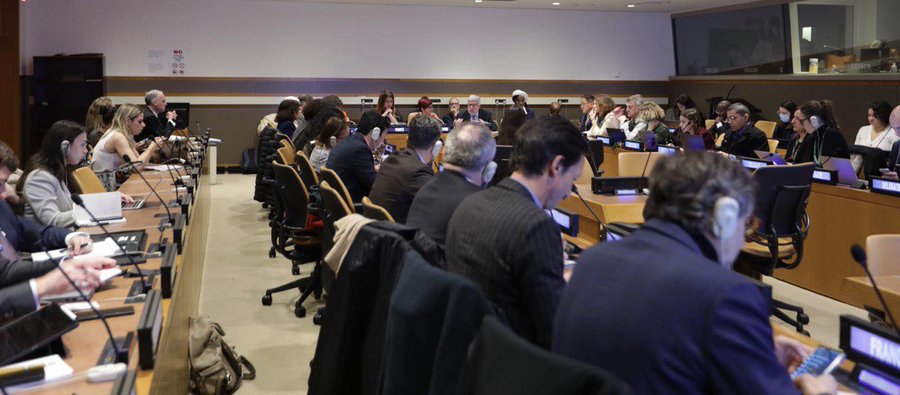How can the international recognition of the social and solidarity economy contribute to the achievement of the SDGs through social and inclusive innovation?

On Tuesday 13 December 2022, a multi-stakeholder meeting between SSE actors (countries, civil society, etc.) took place at the UN in New York. The objective was to discuss how international recognition of SSE can help achieve the SDGs through social and inclusive innovation. Moderator Chantal-Line Carpentier, Director of UNCTAD (United Nations Conference on Trade and Development), member of the General Secretariat and Vice-Chair of the UN Task Force on the Social and Solidarity Economy (UNTFSSE), reminded the audience that achieving the SDGs requires complementary economic models that are more sustainable, inclusive and responsible.
After a keynote speech by Marlène Schiappa, French Secretary of State in charge of SSE and associative life, Augustin Santos Maraver, Permanent Representative of Spain to the UN and Aminata Ly Diop, Deputy Permanent Representative of Senegal to the UN, were able to express their views on the challenges facing SSE, particularly in their respective countries, as well as their contribution to the work on the SSE resolution. This was followed by two interactive discussions with a panel of various speakers (permanent representatives of Argentina, Slovenia, Costa Rica, Mongolia, Korea, Morocco, Dominican Republic, Indonesia) as well as various organisations, associations and networks (ICESSE, GSEF, RIPESS, ILO, Catalyst, CICOPA, WEF, GROUPE SOS, PACT FOR IMPACT, DIESIS, MGEN, etc).

In her introductory speech, Marlène Schiappa was able to recall the potential and the model of progress that SSE represents to respond to global challenges and provide solutions on future production and consumption models to ensure a more local, sustainable and inclusive development.
« The time for SSE has come ».
This time of exchange between multi-stakeholders was also an opportunity for the Secretary of State to stress the need to create international bridges to federate states and civil society around the subject of SSE, particularly to share this vision of the economy, cross the different views and good practices.
« It is the margin that holds the page.
Taking as an example the French legislative commitment since 2014 with the SSE law, Marlène Schiappa insisted on the importance of making a transition towards a systematic search for sustainability, particularly in entrepreneurship, while recalling, however, that SSE needs to be financially supported. Indeed, she praised the resilience and the virtuous model promoted by SSE, such as the 10% of GDP and the 14% of jobs covered by the sector in France.
« […] need to speak the same language, that of action. »
Finally, the Secretary of State recalled that France supports the adoption of the resolution on SSE, which will make it possible « to anchor the role of SSE and its full share in achieving the SDGs ». The latter also welcomed the work done by the Pact for Impact Alliance, announcing that it will have to continue to mobilise if the resolution is adopted at the UN in 2023.

In this regard, Frédéric Bailly, Director of International Activities of the SOS GROUP and Director of Pact for Impact, recalled the decisive role played by the Alliance in the work on the text of the resolution, which will have to be pursued in order to embark new States in « the future implementation of appropriate laws and regulations » on SSE.
The different panellists interviewed highlighted several key elements for a better understanding of SSE and how social and inclusive innovation can contribute to achieving the SDGs.
After widely acknowledging the roots of SSE in their respective countries, the speakers insisted on the need to enhance the creativity and innovation around SSE to build a better and more empathetic post-covid world. The importance of giving impetus to local SSE initiatives (for education, the fight against inequalities or environmental issues) in order to scale them up was also widely emphasised. The panelists insisted on the contribution of SSE to economic growth but also on its role as a democratic pillar. It was then an ambitious and action-oriented resolution that was advocated, as expressed by Rana Dajani from Catalyst:
« We expect this resolution to put wind in the sails of SSE. »
Finally, all the interventions were marked by a collective call for international cooperation and for States to take up the subject of SSE and to put in place the corresponding means of action to achieve this, summarised by Matthias Savignac, President of the Mutuelle Générale de l’Education Nationale:
« This is not the economy of the outstretched hand but of the handshake. »
Check this link if you want to access the replay of the exchange.

